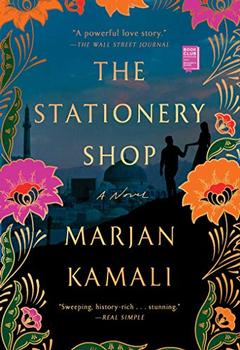Summary | Excerpt | Reading Guide | Reviews | Beyond the book | Read-Alikes | Genres & Themes | Author Bio

A Novel
by Marjan KamaliA powerful love story exploring loss, reconciliation, and the quirks of fate.
Roya is a dreamy, idealistic teenager living in 1953 Tehran who, amidst the political upheaval of the time, finds a literary oasis in kindly Mr. Fakhri's neighborhood book and stationery shop. She always feels safe in his dusty store, overflowing with fountain pens, shiny ink bottles, and thick pads of soft writing paper.
When Mr. Fakhri, with a keen instinct for a budding romance, introduces Roya to his other favorite customer—handsome Bahman, who has a burning passion for justice and a love for Rumi's poetry—she loses her heart at once. And, as their romance blossoms, the modest little stationery shop remains their favorite place in all of Tehran.
A few short months later, on the eve of their marriage, Roya agrees to meet Bahman at the town square, but suddenly, violence erupts—a result of the coup d'etat that forever changes their country's future. In the chaos, Bahman never shows. For weeks, Roya tries desperately to contact him, but her efforts are fruitless. With a sorrowful heart, she resigns herself to never seeing him again.
Until, more than sixty years later, an accident of fate leads her back to Bahman and offers her a chance to ask him the questions that have haunted her for more than half a century: Why did he leave? Where did he go? How was he able to forget her?
The Stationery Shop is a beautiful and timely exploration of devastating loss, unbreakable family bonds, and the overwhelming power of love.
A testament to the enduring powers of storytelling and first love, The Stationery Shop is likely to be a favorite with booksellers and book groups. The author’s website provides a reading guide; the novel absolutely invites reading and discussion along with sweet or savory Iranian cuisine...continued
Full Review
 (826 words)
(826 words)
(Reviewed by Karen Lewis).
In Marjan Kamali's novel The Stationery Shop, Iranian food plays a central role, whether a simple melon smoothie drink, hot tea sweetened with rock sugar candy (nabat), or a more complicated feast for Persian New Year. Traditional cuisine from Iran, also known as Persia, is a mélange of many cultures partly due to a vibrant trading history, situated along the ancient Silk Road.
 Most Iranian meals include rice. In the novel, Roya uses basmati rice to prepare crunchy rice called tahdig. To accompany the rice, a popular choice is gormeh sabzi, which is a stew simmered with lamb and beans, liberally seasoned with coriander, parsley, scallions, and other herbs. Dried limes add a sour flavor. Roya goes to a special market in the San ...
Most Iranian meals include rice. In the novel, Roya uses basmati rice to prepare crunchy rice called tahdig. To accompany the rice, a popular choice is gormeh sabzi, which is a stew simmered with lamb and beans, liberally seasoned with coriander, parsley, scallions, and other herbs. Dried limes add a sour flavor. Roya goes to a special market in the San ...

If you liked The Stationery Shop, try these:

by Marjan Kamali
Published 2025
From the nationally bestselling author of the "powerful, heartbreaking" (Shelf Awareness) The Stationery Shop, a heartfelt, epic new novel of friendship, betrayal, and redemption set against three transformative decades in Tehran, Iran.

by Nazanine Hozar
Published 2021
An extraordinary, cinematic saga of rags-to-riches-to-revolution--called a "Doctor Zhivago of Iran" by Margaret Atwood--that follows an orphan girl coming of age at a time of dramatic upheaval.